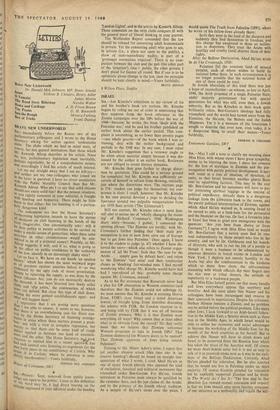ISRAEL
SIR.—Jon Kimche's objections to my review of his and his brother's book are curious. Mr. Kimche SIR.—Jon Kimche's objections to my review of his and his brother's book are curious. Mr. Kimche
begins by ruling me out of order in mentioning that they suppress from the book reference to the Zionist campaigns over the DPs before the war of 1948—because, he writes, the book 'deals with the Palestine war,' and be and his brother published an earlier book about the earlier period. This com- plaint is astonishing, as no fewer than seventy pages —one whole quarter—of the book which I was re- viewing, deal with the earlier background and prelude to the 1948 war. In any case, I must reject Mr. Kimche's suggestion that a reviewer ought to be silent about material simply because it was dis- cussed by the author it an earlier book, Reviewers are not obliged to create literary dynasties.
Mr. Kimche then goes farther to charge distor- tion by quotation. This could be a serious ground for complaint, but Mr. Kimche was sufficiently un- certain of himself to refrain from showing, textually, just where the distortions were. The relevant page is 276: readers can judge for themselves; my con- science is clear. I recall, however, that Mr. Kimche in his own journal devoted a page to deriding the Spectator around two palpable misquotations from my 1959 Suez article (The Ultimatum).
Still not content, Mr. Kimche takes it upon him- self also to accuse me of 'wholly changing the mean- ing' of Richard Crossman's 1946 Washington diary entry—because, I gather, I connected the opening phrase, 'The Zionists are terrific,' with Mr. Crossman's further finding that 'their main pre- occupation is not to save Jews alive out of Europe but to get Jews into Palestine.' Once again, I leave it to the readers to judge (p. 47) whether I have dis- torted the entry—which also refers to Zionist organ- isation of 'all the Press'; finds that 'the case for the Arabs . . . simply goes by default here'; and refers to the Zionists' real aims' and their totalitarian claims as 'shocking' fair-minded men. I find myself wondering what charge Mr. Kimche would have laid , had I reproduced all this: probably some charge against Mr. Crossman, instead?
As to his flat statement that Roosevelt never had a plan for DP absorption in Western countries (and therefore that the Zionists could not sabotage it), we must assume that Mr. Kimche is accusing Morris Ernst, FDR's close friend and a noted American lawyer, of straight lying. Ernst describes discussing the scheme with FDR, the London reaction to it, and being told by FDR that it was all off because of Zionist pressure. Why is it that Zionists want everything all ways? Why cannot they at least admit what is so obvious from the record? Do they really insist that we believe that Zionism welcomed Western proposals to take in Jewish DPs? That Zionism clamoured for Western doors to be opened? That Zionism approves of Jews living outside Palestine?
Turning to Mr. Henry Adler's letter, I regret that yet another abusive attack (this time one is 'an evasive humbug') should be based on straight mis- quotation of what I wrote. I cited Ahad Ha'am as one of many Jewish liberals who opposed the kind of exclusivist, fanatical and militarist movement that triumphed under Ben-Gurion. For Ha'am, Jewish settlement in Palestine must always be qualified by the existence there, and the just claims of, the Arabs; and by the primacy of the Jewish ethical tradition. As a sample of Ha'am's views over the years, would quote The Truth from Palestine (1891), where he wrote of his fellow-Jews already there: Serfs they were in the land of the diaspora and suddenly they find themselves in freedom, and this change has awakened in them an inclina- tion to despotism. They treat the Arabs with hostility and cruelty [and] deprive them of their rights.
After the Balfour Declaration, Ahad Ha'am wrote in At The Crossroads, 1920:
Palestine [is] the common land of Several peoples, each of whom wishes to build its national thline there. In such circumstances it is no longer possible that the national home of one of them could be total.
In Jewish liberalism of this kind there was just a hope of reconciliation—as witness, as late as April, 1948, the Arab proposal of a single Palestine State, under majority government but with special guarantees for what was still, even then, a Jewish minority. But as the Kimches in their book quite brilliantly relate, Bert-Gurion's ideology had fully triumphed; and the world had turned away from the Einsteins, the Ha'ams, the Bubers and the Judah Magneses. Yet it is a measure of the ,fanaticism I sought to describe that even now, even today, it is a dangerous thing to recall their names.—Yours faithfully, Ennismore Gardens, SW7


































 Previous page
Previous page